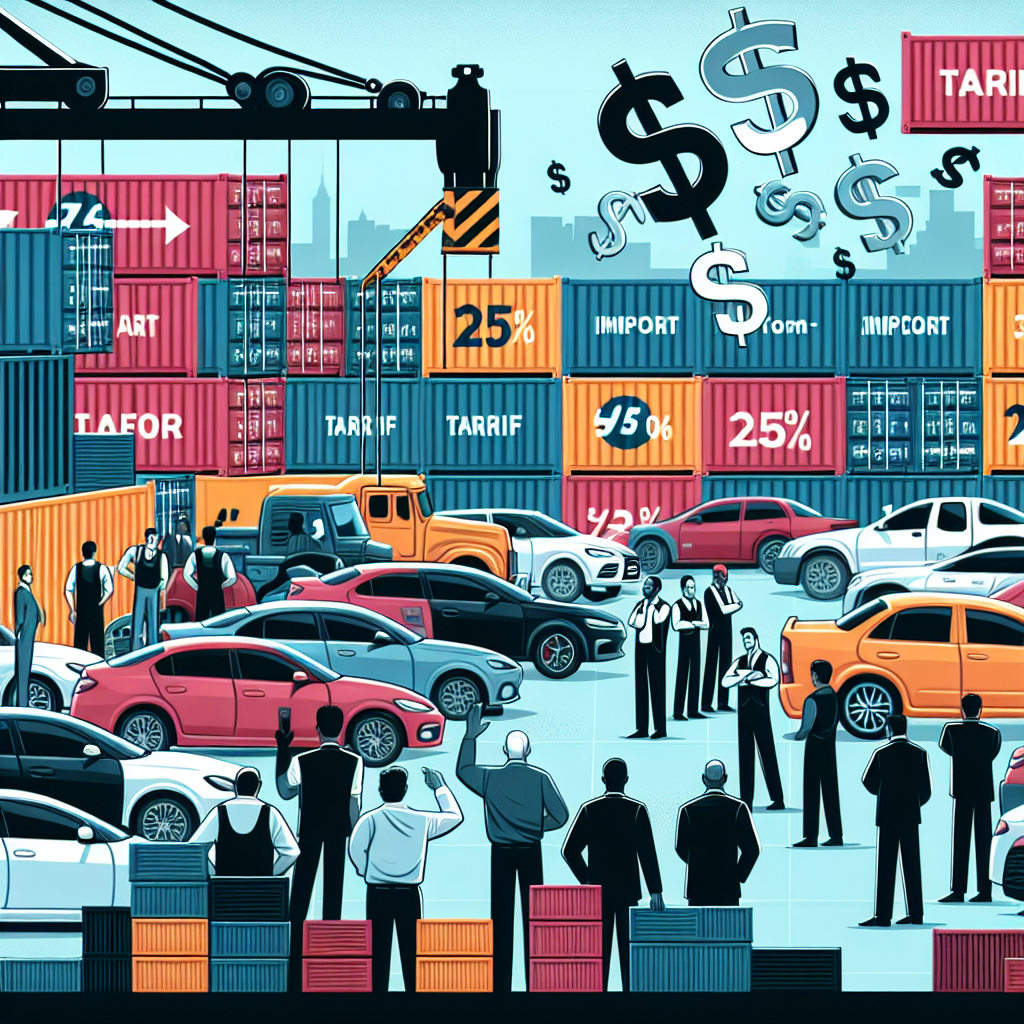Trump’s 25% Auto Tariff Announcement Sends Shockwaves Through Global Auto Industry
Overview: A Bold Trade Move with Far-Reaching Consequences
In a dramatic shift in U.S. trade policy, President Donald Trump announced on Wednesday the imposition of a sweeping 25% tariff on all foreign-made vehicles and auto parts imported into the United States. This decision has sent tremors through the global auto industry, rattling investor confidence and sparking debates across economic and political platforms.
The move is seen as part of Trump’s broader “America First” economic strategy, aimed at reviving domestic manufacturing and reducing trade deficits. However, immediate market reactions suggest the path forward may be far from smooth.
Market Reactions: Stocks Stumble as Tariff Uncertainty Looms
The announcement caused an instant ripple effect across the stock market. Leading U.S. and foreign automakers saw a sharp decline in share prices as investors braced for potential disruptions in the global supply chain.
A notable example is Tesla, the American electric vehicle giant. While Tesla produces all cars sold in the United States domestically, it still relies on certain imported parts. Following Trump’s statement, Tesla shares dropped by 1.3%, reflecting market anxiety around the company’s exposure to supply chain cost increases.
Interestingly, Trump remarked that the regulation could ultimately be “net neutral or even good” for Tesla — a statement implying that domestic producers may benefit in the long term from reduced foreign competition.
Impact on the U.S. Automotive Industry
The new tariffs are expected to hit a broad swath of companies, from Detroit’s Big Three (General Motors, Ford, and Stellantis) to European and Asian manufacturers. The sectors that could be most affected include:
- Luxury carmakers such as BMW, Mercedes-Benz, and Audi, all of which import a significant volume of their U.S. models from overseas factories.
- Parts suppliers that operate on tight margins and may not be able to absorb a 25% cost increase without raising prices to consumers.
- Dealerships, especially those reliant on European and Japanese brands, which may face consumer backlash as vehicle prices inevitably rise.
Increased Production Costs and Consumer Prices
One of the most immediate effects of the tariffs will be a likely increase in vehicle prices for American consumers. The U.S. automotive sector is deeply embedded in a globalized network where parts and vehicles often cross borders multiple times before reaching showrooms. A blanket 25% tariff will raise costs across nearly every segment of the supply chain.
Industry analysts estimate that prices for imported vehicles could rise by $4,000 to $7,000 per unit, depending on the model. Even domestically produced cars may see price hikes, as manufacturers pass on the costs of more expensive imported parts.
The Global Fallout: Tensions with Trade Partners
This move is also expected to strain relations with key U.S. allies, particularly in Europe and Asia, many of whom have auto exports that are crucial to their national economies. The European Union and countries like Japan and South Korea are likely to see this as a provocation and may retaliate with tariffs on American goods.
Furthermore, where global automakers had once considered expanding operations in the U.S., the uncertainty may now deter foreign investment into the American auto industry.
A Possible Boon for Domestic Manufacturers?
While foreign automakers stand to take the brunt of the blow, domestic manufacturers may experience an initial competitive advantage. Companies such as Ford and GM, which operate extensive U.S.-based plants, may be able to ramp up production and potentially gain market share from their international rivals.
However, the situation is murky at best. Many U.S. automakers themselves rely on globally sourced parts and materials, which now fall under the same tariff rule. As a result, even they may be forced to raise prices, undercutting any competitive advantage and potentially shrinking profit margins.
Tesla: A Special Case?
Tesla remains a unique player in this scenario. The company has heavily invested in vertical integration and advanced domestic manufacturing, including its Gigafactory in Nevada and assembly plant in Fremont, California.
Given Tesla’s relatively limited reliance on imported vehicles and growing independence in parts manufacturing, Trump’s statement about the ruling being “even good” for the company may hold some weight — at least in the near term. Tesla’s drop in share price, while modest, suggests investors are cautiously optimistic but concerned about rising component costs.
Uncertainty Ahead: What’s Next for the Auto Industry?
Industry experts agree that the path ahead is uncertain. It remains to be seen if Trump’s tariff plan will face legal challenges, international retaliation, or shifts in implementation. In the meantime, auto manufacturers are likely to reconsider their supply chain strategies, potentially reshoring some production or seeking tariff-exempt alternatives.
Key watchpoints over the coming weeks include:
- Reactions from trade partners and whether reciprocal tariffs will be implemented on U.S. goods.
- Legal and congressional challenges to the executive action.
- Consumer response to rising vehicle prices and shrinking inventory of imported models.
Final Thoughts: A High-Stakes Gamble
President Trump’s 25% auto tariff proposal is a high-stakes gamble that could redefine the structure of the global auto industry. While the intention may be to protect and strengthen domestic manufacturing, the unintended consequences — in higher prices, global trade tensions, and supply chain disruptions — could be profound and long-lasting.
All eyes are now on automakers, policymakers, and international leaders as they navigate this seismic shift in international trade policy. For consumers and investors alike, staying informed will be key in a rapidly changing automotive market.



Leave a Reply